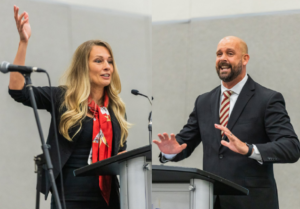
“The disciples came to Him and asked, ‘Why do you speak to the people in parables?’ He replied, ‘Because
the knowledge of the secrets of the kingdom of heaven has been given to you, but not to them. Whoever has will be given more, and they will have an abundance. Whoever does not have, even what they have will be taken from them. This is why I speak to them in parables: ‘Though seeing, they do not see; though hearing, they do not hear or understand. In them is fulfilled the prophecy of Isaiah: ‘You will be ever hearing but never understanding; you will be ever seeing but never perceiving. For this people’s heart has become calloused; they hardly hear with their ears, and they have closed their eyes. Otherwise they might see with their eyes, hear with their ears, understand with their hearts and turn, and I would heal them.’” (Matthew 13:10-15)
Though it is only about forty centimetres in physical distance from a persons head to their heart, the spiritual journey that is sometimes required to travel that distance is far more extraordinary. We often know what we should do as Christians, but struggle with the desire to do it. We think, we analyze, we calculate, and we hope that somehow by knowing the way, or knowing more about the way, we can find in our heart to follow the way. And yet, we can struggle to make up the distance. As time goes by, knowledge that doesn’t make the treacherous quest to the heart gets stuck in the mind; and like a blocked artery that starves the heart of life-giving blood, it prevents us from experiencing a joy-filled, passionate, Christian-life-to-the-full. (John 10:10)

Interestingly, the Pharisees were stuck in this trap. They, along with the disciples, heard Jesus’ teachings. And let’s just say, they weren’t impressed. Instead of the deep theological insights that they were assuredly hoping to hear from Him, Jesus spoke to them about a farmer scattering seeds. His teachings weren’t complicated; they were simple. So simple, in fact, that it was the “unschooled, ordinary men” would become His greatest supporters. (Acts 4:13) The wise men, the educated, the scholarly, and many other knowledgeable people, couldn’t get it. They heard it, but couldn’t understand it. They saw it, but couldn’t perceive it. There was a blockage from their head to their heart. As Jesus said, “Otherwise they might see with their eyes, hear with their ears, understand with their hearts and turn, and I would heal them.”
So what causes this blockage? What causes our hearts to become calloused, so that our all-so-important head-knowledge doesn’t translate in to heart-changing action? I wish we could just chalk it up to one thing. The truth is, though, that there can be many things that cause this blockage. But I want to share three that I’ve personally struggled with, and can speak from experience on.
The first thing that can create a barrier around our heart is cherished sin. The psalmist wrote, “I cried out to Him with my mouth; His praise was on my tongue. If I had cherished sin in my heart, the Lord would not have listened…” (Psalm 66:17-18) Simply put, cherished sin is sin that we love more than we love God. This is a sad reality that is hard to accept, but it is the only explanation for why we choose our sin over God. In fact, we can develop such an affection for our sin that we unconsciously enter into a monogamous relationship with it – a relationship that doesn’t have space for anyone or anything else, including God. Like the famous Lord of The Rings character, Gollum, who cherished the ring, we do everything in our power to protect our sin rather than doing everything in our power to protect our hearts from our sin. Instead of being filled with the life-giving Spirit of God, our cherished sin leads our hearts to the only place sin ever leads: death. (James 1:15)

The second thing that can obstruct the path from our heads to our hearts is hope deferred. The Bible teaches that “hope deferred makes the heart sick.” (Proverbs 13:12) Like a sick person who doesn’t want to eat for fear of vomiting, a sick heart does not want to take in anything that the mind has to offer it. It doesn’t want to eat because it is nauseous with past disappointments. Afraid to hope again, it withers away slowly from malnourishment. This heart tricks us into believing that the safest path forward is not to have hope. But hope is at the very root of faith. “Now faith is confidence in what we hope for and assurance about what we do not see.” (Hebrews 11:1) Where there is no hope, there can be no faith; and where there is no faith, there will never be “a longing fulfilled.” (Proverbs 13:12b) This is not safe, but dangerous and deadly.

Lastly, if our heads were connected to our heart like a steering wheel is connected to the engine of a car, gratitude would be the lubricant allowing all the parts to run the way they should. Conversely, ingratitude and entitlement can produce a hardened heart that is prone to
bitterness. Like a car that is run without oil, it will cause the heart to seize up, and damage it beyond repair. Paul wrote to Titus that it is God’s grace that “teaches us to say ‘No’ to ungodliness and worldly passions,” and that creates a people that are “eager to do what is good.”
(Titus 2:12, 14) Gratitude is what takes us from willing to eager; whereas ingratitude saps the eagerness out of us, makes us unyielding, and eventually causes us “[fall] short of the grace of God,” to “cause trouble,” and to “defile many.” (Hebrews 12:15)
We have all taken many trips throughout our lives; some long, and some short. Some of those trips were more difficult than others, and some more or less important. However, there is no trip more important, and yet more difficult, than the 40-centimetre journey from your head to your heart. As Paul said, “Knowledge puffs up while love builds up.” (I Corinthians 8:1) Let us not be puffed up as the Pharisees were; but let us be built up, and to build up, as Jesus would have us be! And to Him be all the glory!

Evan Bartholomew
